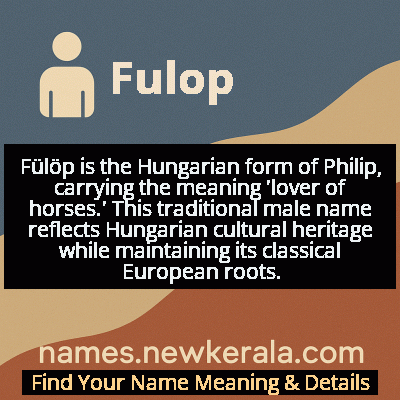Fulop Name Meaning & Details
Origin, Popularity, Numerology Analysis & Name Meaning of Fulop
Discover the origin, meaning, and cultural significance of the name FULOP. Delve into its historical roots and explore the lasting impact it has had on communities and traditions.
Name
Fulop
Gender
Male
Origin
Hungarian
Lucky Number
7
Meaning of the Name - Fulop
Fülöp is the Hungarian form of Philip, carrying the meaning 'lover of horses.' This traditional male name reflects Hungarian cultural heritage while maintaining its classical European roots.
Fulop - Complete Numerology Analysis
Your Numerology Number
Based on Pythagorean Numerology System
Ruling Planet
Neptune (Ketu)
Positive Nature
Intuitive, analytical, spiritual, and inquisitive.
Negative Traits
Secretive, reserved, aloof, and can be overly critical.
Lucky Colours
Green, yellow.
Lucky Days
Monday.
Lucky Stones
Cat’s eye, moonstone.
Harmony Numbers
1, 5, 6.
Best Suited Professions
Scientists, researchers, spiritual leaders, detectives.
What People Like About You
Depth of knowledge, analytical skills, spirituality.
Famous People Named Fulop
Fülöp Ödön
Painter
Renowned Hungarian painter known for his portraits and historical scenes
Fülöp László
Painter
Internationally celebrated portrait painter for European royalty
Fülöp Sándor
Footballer
Hungarian national team goalkeeper during 1930s-1940s
Fülöp Zsigmond
Actor
Influential Hungarian actor and theater contributor
Name Variations & International Equivalents
Click on blue names to explore their detailed meanings. Gray names with will be available soon.
Cultural & Historical Significance
The name's persistence through various historical periods—from the medieval kingdom through the Ottoman occupation, Habsburg era, and into modern times—demonstrates its resilience as a cultural marker. In contemporary Hungary, Fülöp serves as a bridge between traditional values and modern identity, often chosen by families seeking to honor their heritage while maintaining a distinctively Hungarian name. Its continued, though modest, usage reflects the ongoing importance of cultural preservation in Hungarian naming practices.
Extended Personality Analysis
Individuals named Fülöp are typically perceived as embodying strength, reliability, and traditional values. The name's equine etymology contributes to associations with nobility, endurance, and graceful power—qualities that often translate to personality attributes of determination and steadfastness. Fülöp is commonly seen as someone who approaches life with practical wisdom and emotional stability, making them dependable partners, friends, and colleagues.
Beyond the surface characteristics, Fülöp often suggests a person with deep-rooted connections to family and cultural traditions. They are frequently viewed as guardians of heritage who value stability and continuity. This traditional orientation is balanced by a quiet confidence and the ability to adapt when necessary, creating a personality profile that combines steadfast principles with practical flexibility. The name implies a person who moves through life with purpose and dignity, earning respect through consistent action rather than loud proclamation.
Modern Usage & Popularity
In contemporary Hungary, Fülöp maintains a presence as a traditional choice that appeals to parents seeking names with historical depth and cultural significance. While it doesn't rank among the most popular names in recent national statistics, it enjoys steady usage particularly in regions with strong cultural traditions and among families with multi-generational Hungarian heritage. The name has experienced a modest revival as part of the broader trend toward traditional Hungarian names that emerged in the post-communist era, reflecting renewed interest in cultural identity. Its usage patterns show it to be more common in rural areas and among families with strong connections to Hungarian history and traditions, though it occasionally appears in urban settings where parents appreciate its classical sound and cultural resonance.
Symbolic & Spiritual Meanings
Symbolically, Fülöp represents the enduring connection between Hungarian identity and classical European traditions. The name serves as a linguistic bridge between ancient Greek origins and distinct Hungarian character, symbolizing cultural adaptation and preservation. Its equine meaning connects it to powerful symbolic themes of freedom, strength, and nobility—qualities deeply embedded in Hungarian national mythology and the historical image of the Magyar horsemen. In a broader cultural context, Fülöp symbolizes the balance between tradition and progress, representing individuals and families who honor their heritage while engaging with the modern world.

